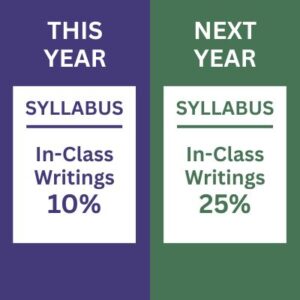 |
| In my March 25 TTT contribution, I promised some suggestions for rethinking assessment to ensure students are meeting learning goals even if they (mis)use gen-AI to create their high-stakes writing assignments. And in my April 22 TTT contribution, I discussed an example of how I am re-weighting low-risk assessments. As promised, in this edition, I share a new type of assessment I am adding to my writing classes: paper conferences. |
Teaching, Tech, and Tidbits Digest
The posts below are from a bi-weekly digest that encapsulates a range of evidence-based best practices and cutting-edge insights on innovative teaching strategies, effective use of technology, student engagement techniques, and effective assessment, to name a few. The content, diligently curated or crafted by the director Dr. Lew Ludwig, is grounded in robust research and drawn from a wide array of innovative articles, books, and online resources. The goal is to support timely, ongoing faculty development with the most current and impactful knowledge in the field.
Tidbit: Let the Robot Vacuum
Tech: Help Your Students Keep Time During Exams
 |
| Last week we held a student focus-group to hear their thoughts on our campus learning spaces. One topic that came up: wall clocks. Students appreciate being able to quickly tell how much time is left, especially when taking an exam. One student appreciated an instructor who digitally projected the time on the classroom screen. Here are a few websites that enable you to do so: |
Teaching: Procrastinertia and the Importance of Planned Downtime
 |
| Procrastinertia. You know that feeling—you’re not actually getting anything done, yet somehow, just the effort of resisting productivity is exhausting. It’s all too familiar as we approach summer, caught between the impulse to rest and the persistent nagging of productivity. Last year at this time, I encouraged you to flip the narrative and schedule your downtime first, treating it as sacred space around which other activities must orbit. |
Teaching: Rethinking Assessment- Reweighting Low Risk
 |
| In my March 25 TTT contribution, I promised some suggestions for how to rethink assessment. If a high-stakes writing assignment can be adequately created with gen-AI, assessing that piece of writing does not provide an accurate measure of how well a student has met a set of learning goals. Instead, we need to seek additional evidence. |
Tidbit: 5 Strategies to Create Inclusive Learning Environments for International Students
 |
| Teaching mathematics, I’m used to having a fair number of international students in my classes. But this semester, something shifted—over 80% of my students are from Southeast Asia. That change has nudged me to rethink my teaching style in more deliberate ways. I’ve started grouping students into fours more consistently and have become much more intentional about my cadence and diction. |
Tech: Easy Grading via Canvas Teacher App
 |
| You can download Canvas Teacher for Android and iOS. This app gives you fast access to all of your courses and allows you to quickly check on submissions and discussions with a phone or tablet. You can even grade through this app using SpeedGrader; annotating and grading assignments with a tablet and stylus is quick and intuitive. |
Teaching: A Simple Hack for Focused Discussions- The Follow-Up List
 |
| Ever feel that tug of tension when a student asks a really thoughtful question—right in the middle of a tightly timed class? You want to honor their curiosity, but you also know: if you go down that rabbit hole, you may not get where you need to go that day. A detour now and then can be invigorating, sure. |
Teaching: Breaking the Ice, Building the Conversation

At the Open Doors debrief, Dan Homan (Physics) shared a small but powerful practice he uses early in the semester to break the ice and cultivate an engaged classroom. In the first few weeks, he gives students a brief in-class writing prompt—just two minutes responding to the reading—and then asks for volunteers to read their responses aloud with dramatic flair.
Tidbit: Still waiting for the right moment to try AI? This is it.
|
|


